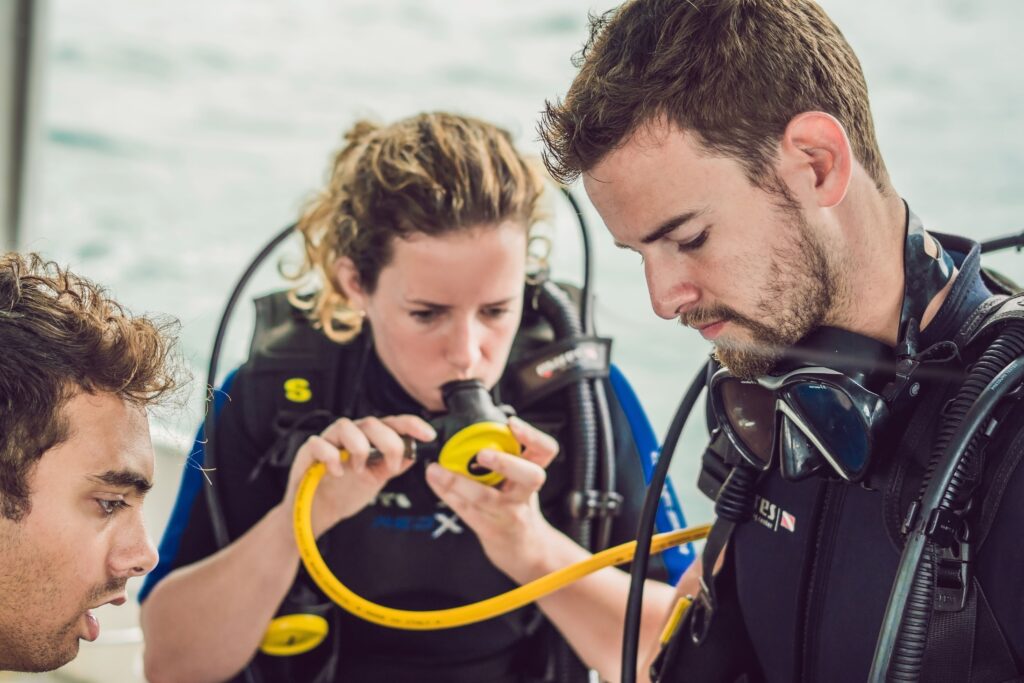Freediving certification is not legally required in most parts of the world, but proper training is strongly recommended for safety, technique, and performance. Freediving immerses you into the underwater world without tanks or scuba gear, relying only on breath control and body conditioning. Freediving immerses you into the underwater world without a tank or scuba gear. Freedivers, such as Marina Kazankova, known for breath-holding, Guillaume Néry from the short film One Breath Around the World, and Herbert Nitsch with the deepest dive depth, are well known by National Geographic and aquatic sports audiences around the world. Guillaume mystified audiences in his short film when he drifted above sharks and suspended himself in the body of the sea with Sperm whales. The experience of being able to dive freely is natural and relieving for many. The amount of time one can hold their breath depends on preparation and bodily capability. If you are wondering whether or not you need SCUBA diving classes to free dive, consider all angles. Then emerge into professional or amateur free diving.

There is an immense difference between freediving and SCUBA diving. SCUBA diving has its certification so that someone can safely operate and use the equipment. The freediving certification, NAUI, helps year learn how to dive with your body. Make sure that your instructor is NAUI certified. Ensure they have not had their certification stripped. One wrong move can render a blackout in shallow water. You need to be able to trust the instructor. SCUBA diving could enhance your free dive experience.
Many argue you don’t even need a freediving certification because there are no rentals required. Freedive seems relatively natural. Observe the spearfishermen from Indonesia who start underwater fishing in their youth. The sea nomad community has been practicing this art for thousands of years. For most of us, our ancestors did not develop or pass on these traits. As seen with the record holders, you don’t need to grow up fishing underwater to free dive for minutes. Your body will need to adjust and adapt to this physically intensive sport. For safety and equipment management, a Freedive certification will be beneficial. Here is how SCUBA diving could help you with freediving. SCUBA diving teaches you how to use a variety of equipment needed to sustain yourself for long periods. The equipment you learn to use is tanks, wetsuits, buoyancy control devices, diving masks, fins, regulator, depth gauge, dive computer, and submersible pressure gauge. When you learn to use tanks, you will gain experience conserving your air. You will get used to a solitary source of oxygen. The same is true for your body when you free dive. With freediving, you will have to learn to capture as much oxygen as possible and maintain it within your body. After you complete a SCUBA certification, you can complete add-on certifications such as cave-diving, shipwreck dives, and Nitrox rich air dives. Breathing Nitrox air allows divers to stay underwater longer. Learning to use Nitrox air will help you with or without equipment. Breathing Nitrox air before entering the water can deliver the oxygen-rich air a diver needs before going underwater for extended periods. Some freedivers breathe Nitrox air before entering the water. Nitrox is not allowed for freediving competitions. There are plans to hold a Nitrox enriched free dive record competition. Having Nitrox ahead of time will likely help keep your blood oxygen and nitrogen-rich and decrease the likelihood of freediver complications over time.
Over time more courses will emerge for free diving. Taking a SCUBA course allows you to get used to the feel of freediving. You learn how to use equipment, and you enable yourself to get used to the various pressures of the water.
If you are interested in taking a SCUBA course or have questions about freediving, ask Kevin Alexander our Senior PADI instructor for advice.
Sources
